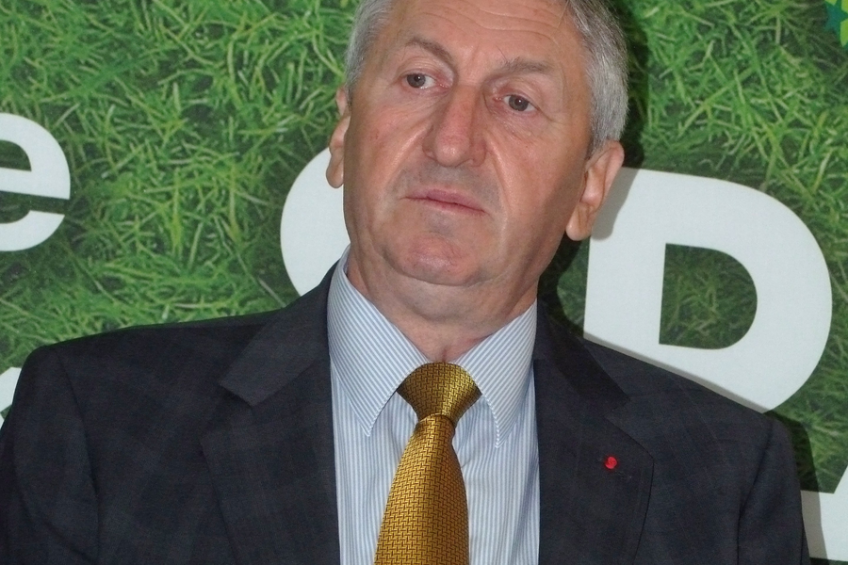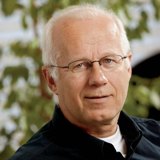“Livestock farmers need support instead of being penalised”

Agriculture is of great importance for France. Especially as livestock farmers have successfully met many challenges in the last 50 years. They are ready to meet many others, provided they are more encouraged than penalised, said Jean-Michel Lemetayer, president of SPACE, when he welcomed the French president François Hollande at SPACE. The world’s leaders need to adopt the necessary measures to meet the great challenge of feeding the world’s present and future population.
Faced with the rocketing prices of raw materials and increases in the costs of animal feeds, livestock farmers have been hard hit by this summer’s sharp price rises. In July, the price of soya doubled as compared with January, the price of oilseed rape rose by 70%, feed for pigs by 25%, turkey feed by 50%, cattle cake by 63%. Against this background Jean-Michel Lemetayer, President of SPACE, explained president François Hollande that after years of destructive deregulation it is high time to re-introduce regulations at all levels. Lemetayer: “There is a crying need for real global governance in this field. The measures put in place for agriculture by the G20 group must be made truly effective: real knowledge of stocks under the FAO surveillance system, real consultation to avoid unilateral decisions by countries to freeze their exports, causing panic in world markets. To the physical shortages arising in particular from climatic conditions are added the perverse effects of financial speculation, which artificially magnifies and aggravates crises.
This “financialisation” of markets adds further volatility to the volatility that already exists, making it unbearable. We have great expectations of the measures Europe is preparing to combat such financial speculation and minimise its effects. It is important for Europe, but it is vital for the poorest countries.”
A key role to play
Lemetayer challenged president Hollande to play a leading role in persuading its European and global partners to continue to place agriculture and the food trade at the hearts of the G20’s concerns and actions. He said: “We now have to feed six billion people on our planet, and we know that far too many human beings still suffer from malnutrition. In the future, we shall have to feed a population of nine billion. The FAO and OCDE have calculated that global food production will have to increase by 60% to meet demand.France and Europe have a key role to play in introducing or re-introducing effective policies for regulating markets and managing crises, which first means creating strategic stocks. We need to support the organisation of regionally based policies worldwide, and help developing countries to build up stocks so that they are able to feed their own populations adequately.
As we know, Europe is not called to dominate all markets, but it does have a moral obligation to help meet the challenge of feeding the world. It has the good fortune to enjoy exceptional soil and climate conditions. This good fortune is not shared by the major emerging countries, such as China and India, which account for 37% of the world’s population but possess only 19% of its arable land.”
Re-inventing partnership
“We need to re-invent the terms of partnership between arable and livestock farmers,” declared Lemetayer. “Animal feeds is one of the principal markets for arable crops. Measures need to be seriously augmented to cushion fluctuations in prices and incomes. These mechanisms should enable our agricultural enterprises to become more competitive again.
The issue of the competitiveness of French agriculture, in particular livestock farming, is now crucial, an area in which further progress needs to be made. It is crucial because agriculture and food-processing make an essential and decisive contribution to the French economy and the stability of our country, to its trade balance and to employment: with 3.5 million employees, our industries are the 2nd largest source of employment in France!It is also crucial because we are constantly losing ground to our competitors not only emerging countries such as Brazil and Argentina, but also our EU neighbours”.
Poultry production dropped 20%
Over the last 10 years, France has seen a drop of 450,000 tonnes in poultry production (i.e. 20%), the beneficiaries being Brazil and Argentina in particular. Over the last 15 years, Brittany has lost 800 poultry farmers, 1 million square metres of poultry farms, and 10,000 jobs in the sector. The downfall of the Doux empire has greatly aggravated the situation.
Over the last 10 years, the meat sector has grown by 23% in terms of production and 35% in terms of slaughtering in Germany, 17% in Spain, 15% in Denmark, while in France it has contracted by 1%.
“One of the key reasons for these changes is the cost of labour. The ratio between France and Germany is 1:3. Casual workers from Eastern Europe and the European Union, paid at €6 per hour, occupy on average two thirds of the available jobs in German slaughterhouses. This shows”, as Lemetayer said to his president, ”how necessary it is, not to move towards a lowering of wages in France, but to reduce the cost of labour and remove factors which distort competition between European countries, so as to restore competitiveness to our agricultural industries and enable them to invest in sustainable production systems”.
Vibrant SPACE bigger than ever
The French agro-trade show SPACE keeps on growing in number of exhibitors as well as (international) visitors. Despite the souring economical situation of the French agro-industry the interest for investments in regaining competitiveness.The 26th edition of SPACE, the French agriculture trade fair, took place from 11 to 14 September 2012 in Rennes in a very positive atmosphere. It has once again, with 62,500 m2 of exhibition stands, beaten the record set last year. This amply confirms SPACE’s ranking among trade fairs devoted to livestock production, said Jean-Michel Lemetayer, president of SPACE. He ranked SPACE to be 1st in France, 2nd at the European and world levels and is very proud to have developed the exhibition to this level over the last 25 years. It grew from 260 exhibitors in 1987 to the current 1,300, and from 32,000 to 109,035 visitors this year.
More international
Over the years, SPACE’s international influence and impact has also increased considerably. The number of international visitors increased again by 10% to a total of 11,080 visitors coming from 110 countries. This international attendance was marked by the diversity of visitors’ origins, with a large number of visitors from neighbouring European countries (Spain, Italy, Ireland, Great Britain and Belgium in particular) and large delegations from more distant locations, such as Egypt, Turkey, South-East Asia, West Africa and Brazil.
Exhibitors were also pleased to note a significant evolution in the number of international decision-makers (ministers included) and investors present. According to many exhibitors, contacts with visitors was very productive for all types of livestock farming, as well as for the vast array of equipment providers exhibited outdoor.
Building for the future
This 26th SPACE fair proved that in spite of a context marked by the soaring cost of raw materials, farmers have big plans for the future. They are aware that much has to be done to regain their international competitiveness. This explains too the increased interest by many producers for the numerous technological innovations for tomorrow’s livestock farming presented under the theme “Buildings and equipment for the future” in the Research and Development area. For that reason it was a pity that there were less exhibitors in the poultry section. Some companies were absent due to the “ban” by Showco members (they want to reduce the number of exhibitions they are prepared to participate in a year) and the economic crisis which forced many to cut costs to be able to participate in EuroTier later in the year.
Nevertheless the poultry section remained lively and attractive to witness the developments in the French poultry industry. Among the 47 registered innovation there were a couple (14) sent in by poultry related companies. Only one them received a three star award: NoReds, an innovative product against red mites.
Presidential visit
A highlight for SPACE was the official visit of the recently elected president of France, François Hollande. He was accompanied by three of his ministers, which underlined his support for agriculture and farming. In his address to the exhibitors and invited guests he promised that his government will support French agribusiness so it can again become leading in Europe and even in the world. France used to be a major exporter of poultry meat but has lost its position and is today a net importer.Companies like Bourgain and Doux were leading and among the largest poultry meat companies in Europe. The first went bankrupt several years ago and Doux followed recently. Hollande called for complete transparency on Doux’s history and the reasons for its fall. Hollande sees food production as one of the key solutions to aiding France’s economic recovery.













